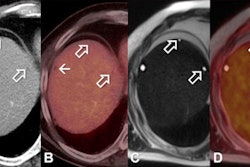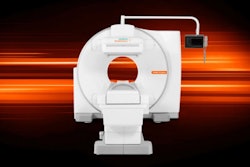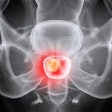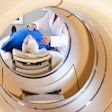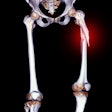Sunday, December 1 | 12:05 p.m.-12:15 p.m. | SSA07-09 | Room E450A
Italian researchers have found that diffusion-weighted MRI (DWI-MRI) offers higher specificity than PET/CT in rectal cancer patients, especially in cases of active inflammatory tissue, but PET/CT has a higher sensitivity and can detect distant metastasis.DWI "can be useful for an early diagnosis of recurrence, allowing radical surgery or better local control of illness," lead author Matteo Cappucci, a radiology resident at Sant'Andrea Hospital of the University of Rome "La Sapienza," told AuntMinnie.com.
The study included 25 patients (mean age, 64 years) who had been treated with neoadjuvent chemoradiation therapy and surgical resection for rectal cancer. The patients were subsequently referred for MRI and PET/CT due to a high suspicion of local recurrence at follow-up. Mean time of diagnostic evaluation after surgical resection was 14 months.
MRI was performed on a 1.5-tesla system with turbo spin-echo T2-weighted imaging on sagittal, axial, and coronal planes; DWI axial scans; and postcontrast fat-saturated fast low-angle shot (FLASH) 2D T1-weighted axial scans. Whole-body PET/CT images were acquired 60 minutes after injection of 185 MBq of FDG.
DWI and PET/CT were both negative in 15 cases and both suggested recurrence in seven subjects. The patients with concordant findings of fibrosis remained disease-free after 10 months of follow-up.
Recurrence was confirmed by biopsy in six patients, while one patient's suspected diagnosis was proved incorrect by histology.
Sensitivity for DWI was 86%, compared with 100% for PET/CT. Specificity was 94% for DWI and 83% for PET/CT, and accuracy was 92% for DWI and 88% for PET/CT.
DWI is a useful technique for detecting small tumor tissue, Cappucci and colleagues concluded. "Preliminary studies show its benefits to detect locally recurrent rectal cancer and suggest [the introduction of] these sequences in the conventional MRI protocol to evaluate these patients," Cappucci added.






